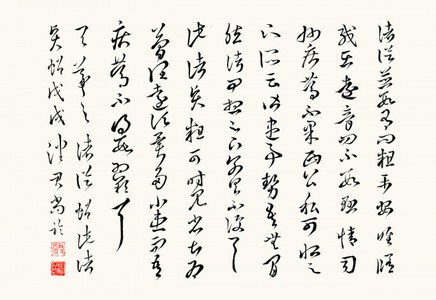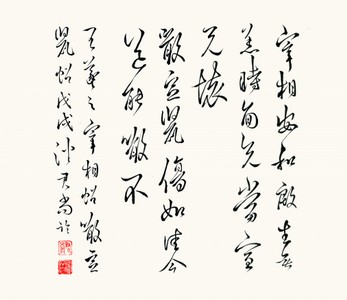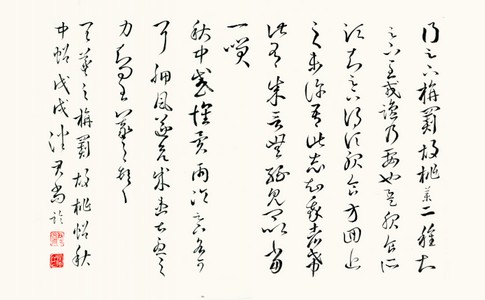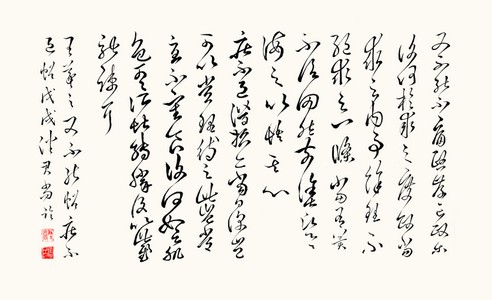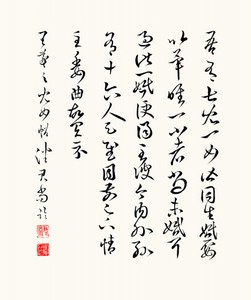Galleries and Translations > Models of Masterpieces > Models of miscellaneous Masterpieces by Wang Xizhi (part II) 臨王羲之諸法帖 (第二部份)
Models of miscellaneous Exemplary Masterpieces by Wang Xizhi (part II) 臨王羲之諸法帖 (第二部份)
Historical information
(I)
Wang Xizhi (王羲之) is often considered to be the most outstanding Chinese calligrapher of all time and is regarded as “The Sage of Calligraphy (書聖)” in China and Japan. Born in 303AD in an upper-class aristocratic family, Wang Xizhi started learning Chinese calligraphy at the age of seven from the renowned calligrapher Wei Shuo (衛鑠 or 衛夫人, 272-349AD). His father, Wang Kuang (王曠, ?-?AD), was a government prefecture chief (太守) and was also a calligrapher. His uncle, Wang Dao (王導, 276-339AD), was the prime minister (丞相) during the reign of Emperor Cheng of the Eastern Jin Dynasty (晉成帝, 321-342AD ). Further biographic information of Wang can be seen on my page regarding Lanting Xu (蘭亭帖).
(II)
The calligraphies presented below are my models of Wang Xizhi's handwriting found in Chunhua Imperial Archive of Calligraphy Exemplars (《淳化閣帖》). Supposedly, these handwritings were short letters and memos scribed by Wang. Although their authenticities are questionable, they are still often regarded as Exemplary Masterpieces (法帖) for calligraphers to study and observe. In the art of Chinese calligraphy, "帖(pronounced as Tie)" refers to an exemplary work that should be studied by all .
(III)
Since the originals in the Chunhua Imperial Archive of Calligraphy Exemplars (《淳化閣帖》) can be parts of or whole letters/memos scribed by Wang, translations that are provided below, if available, may not be entirely precise, for they can be interpreted out of context. Further, whether Wang had actually scribed them remains questionable. Accordingly, scholars should be wary of using these as authentic historical references.
A model of Zhu Cong Tie (諸從帖), Ci Zhu Xian Tie (此諸賢帖)
35 X 51 cm
Click to Enlarge. Reserved, not available in shop.
Zhu Cong Tie (諸從帖):
Original Classical Chinese: 諸從並數有問,粗平安。唯修載在遠,音問不數,懸情。司州疾篤,不果西,公私可恨。足下所云,皆盡事勢,吾無間然。諸問想足下別具,不復具。
English: Those among our Wang clan often write and communicate with me, and they are all more or less fine. Only Xiuzai (修載) was severely ill and so he ultimately did not travel west to take on his appointed position, regrettable news both personally and professionally. What you stated earlier is complete and the full picture of the situation and so I have nothing else to supplement. I believe others in the Wang family had also written to and communicated with you, so I will not again detail their circumstances here. (interpreted by KS Vincent Poon based on the vernacular Chinese interpretation below by Professor Lin Li E)
Vernacular Chinese: 我們王氏同族諸位常與我通信,大家都大致平安。只有修載(王耆之,字修載)在遠處,比較不常通信,心裏常懸掛著。司州(王胡之,字修齡)病重,終不能西行赴任(晉穆帝永和五年授司州刺史,以病重,未行而殁)。公事、私事兩方面,多有讓人痛心之處,您(王羲之的好友周撫)信中所言,皆詳中時勢的癥結,我沒什麼可以補充的。王氏同族諸位,想必您都另有書信給他們,我就不再多叙。 (譯者:林麗娥教授)
Ci Zhu Xian Tie (此諸賢帖):
Original Classical Chinese: 此諸賢粗可,時見省,甚為簡闊,遠(須)〔頃〕異,多小患,而吾疾篤,不得數為歎耳。
English: NA. The entire phrase may not be translated, for the context in which it was written is unknown or uncertain.
A model of Zai Xiang An He Tie (宰相安和帖) and Dan Dou Shu Tie (噉豆鼠帖)
35 X 41 cm
Click to Enlarge. Reserved, not available in shop.
Zai Xiang An He Tie (宰相安和帖):
Original Classical Chinese: 宰相安和,殷生無恙,時面。兄當宣兄懷。
English: NA. The entire phrase may not be translated, for the context in which it was written is unknown or uncertain.
Dan Dou Shu Tie (噉豆鼠帖):
Original Classical Chinese: 噉豆。鼠傷如佳,今送。能噉不?
English: NA. The entire phrase may not be translated, for the context in which it was written is unknown or uncertain.
A model of Zhan Ji Hu Tao Tie (旃罽胡桃帖) and Qiu Zhong Tie (秋中帖)
35 X 57 cm
Click to Enlarge. Reserved, not available in shop.
Zhan Ji Hu Tao Tie (旃罽胡桃帖):
Original Classical Chinese: 得足下旃罽、胡桃藥二種,知足下至, 戎鹽乃要也,是服食所須。知足下謂須服食,方回近之,未許吾此志。知我者希,此 有成言,無緣見卿,以當一笑。
English:I have received the sandalwood (?), the walnuts, and the two kinds of medicine from you. I gratefully acknowledge your great [consideration for me]. Turkestan salt is another thing I require. I need it when I take elixirs. I know that you approve of elixirs. Lately, Fanghui [i.e., Wang’s brother-in-law Xi Yin] did not want to allow me this view. “Few are those who know me”—this has become a saying. There is no opportunity to see you, whereby we might share a laugh. (Translated by Antje Richter & Charles Chace in The Trouble with Wang Xizhi: Illness and Healing in a Fourth-Century Chinese Correspondence (T’oung Pao 103-1-3 (2017) 33-93))
Qiu Zhong Tie (秋中帖):
Original Classical Chinese: 秋中感懷雨冷,冀足下各可耳,(脾)〔胛〕風遂欲成患,甚憂之,力知問,王羲之頓首。
English: It is mid-autumn and I feel a longing for you. It is rainy and cold, but I hope you and your family are fairly well. It looks as if the Wind disorder in my shoulder is threatening to become a [serious] ailment. I am very worried about it. Pray do let me hear from you. Wang Xizhi knocks his head on the ground*. (Translated by Antje Richter & Charles Chace in The Trouble with Wang Xizhi: Illness and Healing in a Fourth-Century Chinese Correspondence (T’oung Pao 103-1-3 (2017) 33-93))
*"Wang Xizhi knocks his head on the ground (王羲之頓首)" should be better interpreted as "Wang Xizhi gratefully bows in respect and deference" (KS Vincent Poon).
A model of You Bu Neng Tie (又不能帖) and Ji Bu Tui Tie (疾不退帖)
35 X 58 cm
Click to Enlarge. Reserved, not available in shop.
You Bu Neng Tie (又不能帖):
Original Classical Chinese: 又不能不痛熙薦亡,政爾,復何於求之? 度政當求之內事。余理不絕,求之一條,當有冀不?信罔然前途願一一。誨之,以悟其心。
English: NA. The entire phrase may not be translated, for the context in which it was written is unknown or uncertain.
Ji Bu Tui Tie (疾不退帖):
Original Classical Chinese: 疾不退,潛損,亦當日深,豈可以常理待之。此豈常憂。不審食,復何如? 雲肌色可可。所堪轉勝,復以此慰。馳竦耳。
English: NA. The entire phrase may not be translated, for the context in which it was written is unknown or uncertain.
Ji Bu Tui Tie (兒女帖):
Original Classical Chinese: 吾有七兒一女,皆同生。婚娶以畢,唯一小者尚未婚耳。過此一婚,便得至彼。今內外孫有十六人,足慰目前,足下情至委曲,故具示。
English: I have seven sons and a daughter, all of whom were born from the same mother. They are all married, with the exception of my youngest son. Once this marriage of his is confirmed and the ceremonies concluded, I can leave for your place. Presently , I have a total of sixteen grandchildren, and so I am rather satisfied with my current status. Your devoted friendship towards our family is most amicable, and so I am detailing all these to you. (interpreted by KS Vincent Poon based on the vernacular Chinese interpterion below by Professor Lin Li E)
Vernacular Chinese: 我有七個兒子,一個女兒,都是同母所生,婚娶都已完畢,只剩最小的一個(王獻之)還沒結婚而已。只要等這一婚事完成,就可以到你那裏(蜀地)去。現在內外孫總共有十六人,眼前頗覺安慰。您(王羲之的好友周撫)對我情深意厚,所以特別具陳以告。 (譯者:林麗娥教授)
